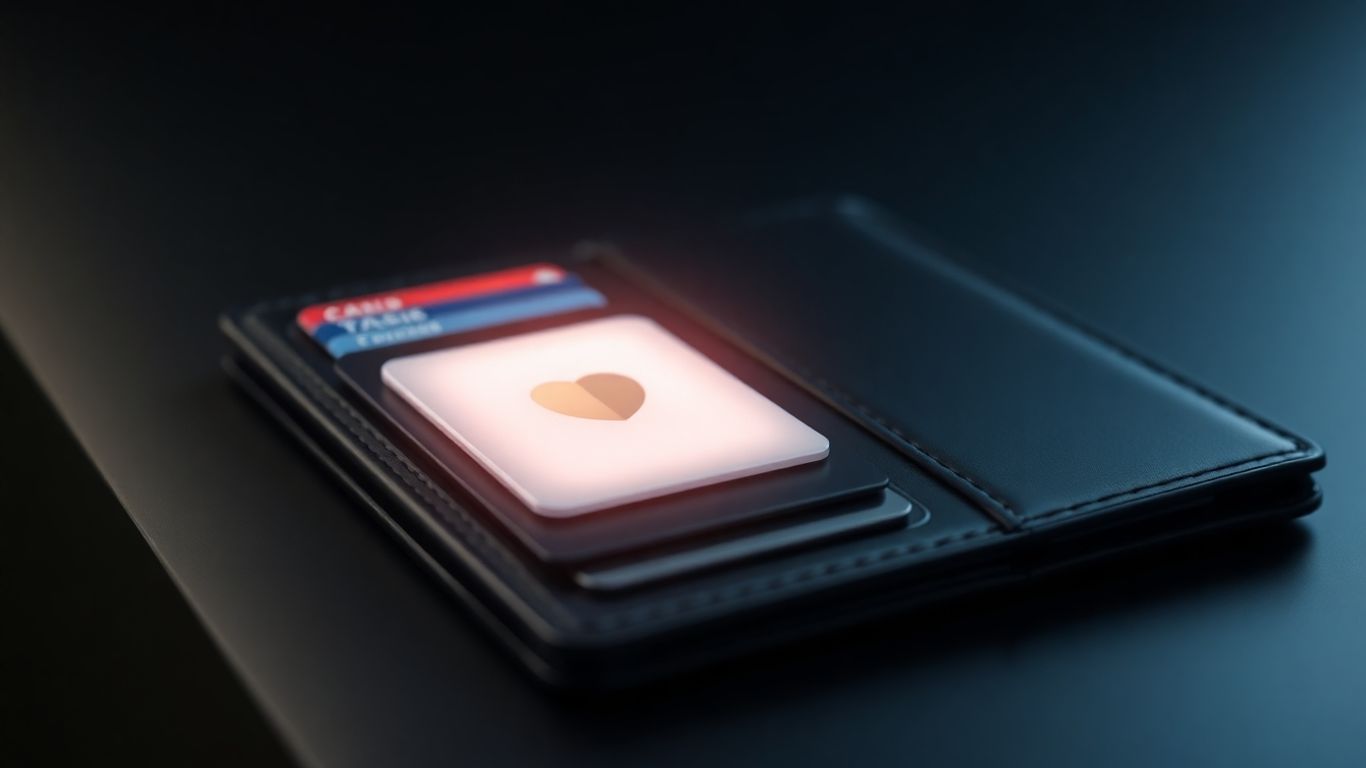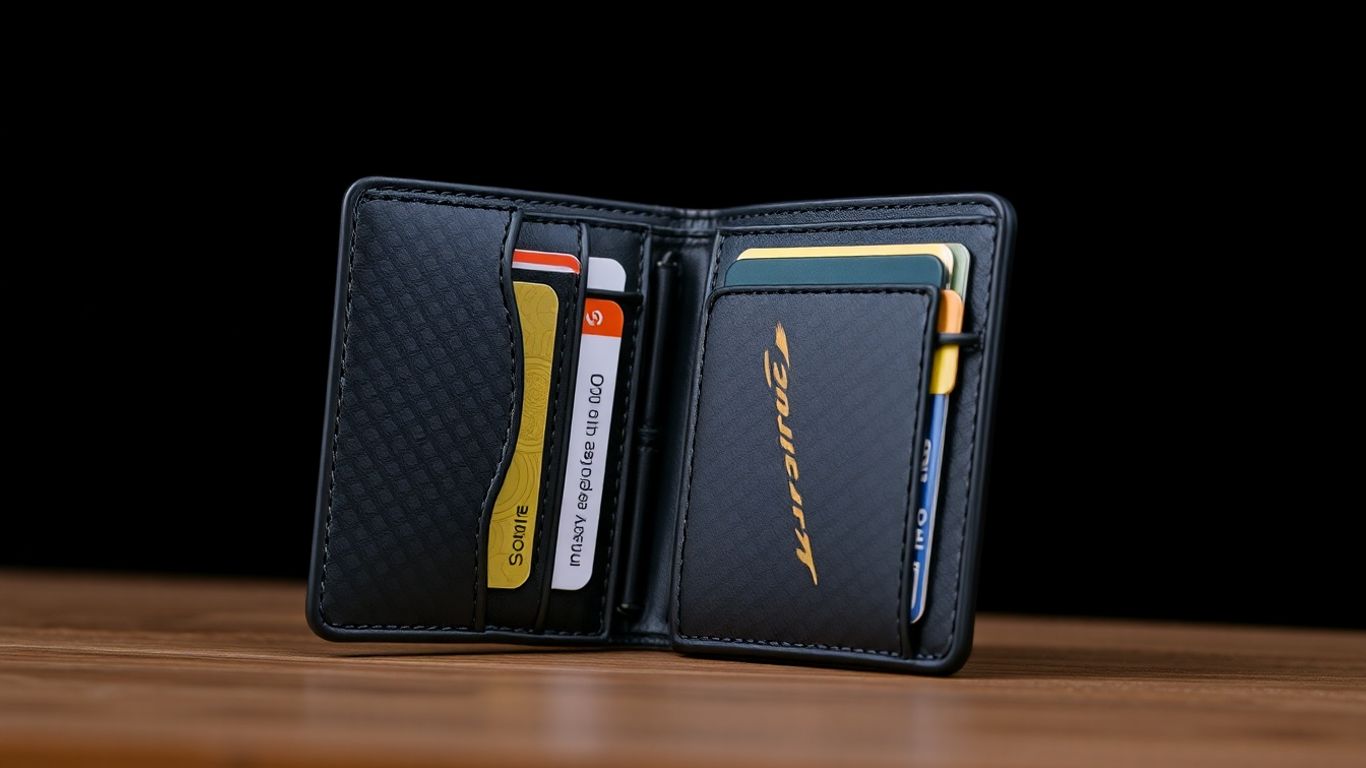[ newsletter ]
Stay ahead of Web3 threats—subscribe to our newsletter for the latest in blockchain security insights and updates.
Thank you! Your submission has been received!
Oops! Something went wrong. Please try again.
Discover the best scanner wallets for 2025. Protect your cards from digital theft with top RFID-blocking options. Find your perfect wallet today!





Tap-to-pay tech is super handy for quick purchases, but it also opens the door for sneaky thieves. That's where a good scanner wallet comes in. These wallets act like a shield for your important cards, keeping your info safe from digital pickpockets. We looked at a bunch of options, focusing on how well they protect your data, how organized they keep your stuff, how they look, how practical they are, and of course, the price. Here are some of the best scanner wallet choices for keeping your identity secure when you're out and about.
When you think about keeping your cards and cash safe from digital theft, The Ridge wallet often comes up. It’s a pretty popular choice, and for good reason. This wallet is made from aerospace-grade aluminum, which makes it feel really solid and durable. It’s designed to be super slim, fitting comfortably in your front pocket without creating a bulky outline.
One of the standout features is its expandable card slot. It can hold up to 12 cards, and the elastic design means it won't stretch out over time like leather or fabric wallets can. This keeps your cards snug and secure. Plus, you have options for carrying cash: either a simple elastic strap on one side or a money clip on the other. This gives you flexibility depending on how much cash you usually carry.
The aluminum construction also means it’s pretty resistant to scratches, so it should hold up well to the daily grind. It’s a wallet that’s built to last, and the company even makes it easy to replace parts like the elastic, screws, money clip, and cash strap plate. You won't be able to fit larger documents like passports or boarding passes in here, though.
This wallet is a solid choice if you want something slim, tough, and secure for your everyday cards. It forces you to carry only what you need, which is a nice change from those overstuffed old wallets.
If you're looking for a straightforward way to keep your credit cards and IDs safe from wireless skimming, the SignalVault card protector is a solid choice. It's basically a credit card-sized insert that you just slip into your existing wallet. No need to buy a whole new wallet or fuss with individual sleeves for each card. This thing uses something called E-Field technology to create a protective bubble around your cards, stopping unauthorized scans. It's pretty neat because one SignalVault card can actually protect several other cards that are nearby. Think of it like a personal bodyguard for your payment information. It's been tested by third parties and even got a nod on Shark Tank, so it's a pretty well-known option. Plus, they usually come in packs of two, so you can get one for your everyday wallet and a spare, or you can use one for travel. This type of protection is especially useful when you're in crowded places like airports or busy city streets where electronic pickpocketing is more likely to occur. It's a passive defense, meaning it doesn't require any power or setup – it just works. While many newer credit cards have some built-in security, having an extra layer of defense doesn't hurt, especially if you travel a lot or just want that extra peace of mind. It’s a simple, affordable tool to add to your everyday carry. You can find out more about how these cards work on SignalVault's website.
Here's a quick look at what makes it a good option:
While these cards are great for blocking specific types of wireless scans, remember that credit card fraud can happen in other ways too. It's always a good idea to keep an eye on your bank statements and set up alerts for transactions. Checking your credit reports regularly is also a smart move to catch any unexpected activity.
If you're looking for a simple way to add some protection to your existing wallet without buying a whole new one, the TICONN RFID Blocking Cards are a solid choice. These cards are about the same size as your regular credit cards, so they slide right in next to your other cards. They work by creating a sort of jamming signal that stops unauthorized RFID and NFC scans. You don't have to do any setup or change how you carry your cards; just pop one into your wallet or phone case. These cards are designed to block the common 13.56MHz frequency, and they offer protection in about a two-inch radius. They're pretty lightweight, can handle some scratches, and seem like they'll last a good while. It's a pretty straightforward way to get some peace of mind, especially if you're often in crowded places like airports or busy train stations. This makes them a great option for adding an extra layer of security to your everyday carry.
While these cards are great for blocking specific types of wireless scans, remember that credit card fraud can happen in other ways too. It's always a good idea to keep an eye on your bank statements and set up alerts for transactions. Checking your credit reports regularly is also a smart move to catch any unexpected activity. You can find out more about how these cards work on TICONN's website.
Here's a quick look at what makes them stand out:
Blocking RFID signals isn't overly complicated. The core idea is to create a barrier that either reflects or absorbs the radio waves used by scanners. These cards essentially act as a mini Faraday cage for your cards, preventing unauthorized access to the data stored on the RFID chips.
When you're out and about, especially in crowded places, keeping your cards and cash secure is a big deal. The Zero Grid Travel Neck Wallet is designed for just that. It's meant to be worn around your neck, tucked under your shirt, which makes it pretty tough for anyone to get to your stuff without you knowing. This setup keeps your essentials close and safe.
It's made from ripstop nylon, so it's tough but also light, meaning it won't feel like a burden. You get several pockets, including a main spot for your passport and bills, and smaller ones for your cards. The strap is adjustable and padded, so it's comfortable even if you wear it for a while.
This type of wallet is great for busy spots like airports or city streets. It keeps everything close to your body, giving you peace of mind.
Here's a quick look at what it offers:
The Zero Grid Travel Neck Wallet is a solid choice if you want to keep your cards and personal information safe while you're traveling.
So, you've got your favorite wallet, but what about the cards inside it? That's where RFID blocking sleeves come into play. Think of them as tiny, personal bodyguards for each of your cards. They're basically thin pieces of material, often plastic or a special fabric, that you slip your credit cards, debit cards, or even your passport into. The whole idea is to stop those sneaky radio waves from getting to the chips embedded in your cards. You know, the ones that let you tap and pay? Well, those same chips can sometimes be read by unauthorized scanners, which is what people call electronic pickpocketing. It sounds a bit sci-fi, but it can happen, especially in crowded places.
These sleeves are super simple to use. You just slide a card into one. It's not exactly rocket science, which is a plus in my book. They're also pretty cheap, so you can get a bunch without breaking the bank. Plus, you don't have to ditch your favorite wallet; you just add these little shields to the cards you want to protect. It’s a good way to add a layer of security if you’re not ready to commit to a whole new RFID-blocking wallet. If your current wallet isn't RFID-blocking, these sleeves are a budget-friendly way to get that protection without a complete overhaul. You can use them for credit cards, debit cards, transit cards, or even your passport if it has an RFID chip. You get to keep using your favorite leather or fabric wallet while still adding that digital security feature.
While the risk of RFID skimming might seem low for most people, it's the kind of thing that can cause a lot of trouble if it happens to you. These sleeves offer a simple, low-cost way to add a bit of peace of mind, especially if you're often in crowded places like airports or busy city centers. It's worth noting that while these sleeves are effective, they do add a little bulk. You'll need to slip each card into its own sleeve, and then put those into your wallet's card slots. So, if you carry a ton of cards, your wallet might get a bit thicker. Also, remember that you'll need to take the card out of the sleeve to use contactless payment features, which is a minor inconvenience but a necessary step for security.
The key is that the conductive material needs to completely enclose the item you want to protect. If there are any gaps or holes, the signals might still get through.
Here’s a quick rundown of what to expect:
If you're looking for a practical way to protect your cards while traveling, these sleeves are definitely worth checking out. They're a popular choice for a reason, offering a good mix of security and convenience for travelers. You can find a great selection of these at many online retailers.
You might have heard about people wrapping their credit cards in aluminum foil to block RFID signals. It's a pretty basic, do-it-yourself kind of thing. Honestly, it can work in a pinch to stop casual scans. Think of it as a quick shield for your cards when you're out and about and worried about someone trying to skim your information.
It's not exactly a wallet, though. You're basically just folding up some foil around your cards. It won't hold your cash or give you easy access to your most-used card. Plus, it's not very durable, and you'll go through a lot of foil if you do this regularly.
While it might seem like a clever hack, relying only on aluminum foil for long-term card security isn't the most practical or reliable approach. It's more of an emergency measure than a dedicated solution.
It does block RFID signals, but you have to wrap it just right, and even then, there's a chance a strong signal could get through. It's definitely not as robust as a purpose-built RFID blocking wallet. It's more of a temporary fix, really. You'd probably want something more permanent if you're serious about protecting your cards.
Here's a quick look at its effectiveness:

Losing your wallet is a real pain, and nobody wants that experience. That's where trackable wallets come into play. Think of them as having a little GPS for your wallet. Many of these wallets let you pair a slim tracker card with your smartphone. This means you can see your wallet's last known location on a map, which is pretty handy if you think you left it somewhere. If it’s close by, you can even make the tracker ring, helping you find it quickly. Plus, a lot of them will send you alerts if you accidentally walk away and leave your wallet behind. It’s like having a digital safety net for your most important everyday item.
These smart wallets are really changing the game. They’re not just about holding your cards anymore; they’re becoming more like personal security devices. By integrating technology, they help solve common problems like misplacing your wallet, making life a bit simpler and definitely more secure. For example, Ekster's trackable RFID-blocking wallets offer advanced data protection, keeping your personal information safe from digital thieves.
Here’s a quick rundown of what makes them useful:
It’s a smart move to consider a wallet that offers this kind of peace of mind, especially if you’re prone to misplacing things or travel frequently. You can find some great options that integrate tracking technology, like the Ekster Parliament RFID-Blocking Wallet, which combines a durable, lightweight material with smart tracking capabilities.
Sometimes, the biggest threats to your cards aren't digital scanners, but actual water. Think about dropping your wallet in a puddle, or getting caught in a sudden downpour. That's where waterproof wallets come in. They're built tough, using materials and designs that keep moisture out, protecting your cash and cards from spills, rain, or even being submerged for a short time. It's a different kind of security, focusing on the real world.
When you're looking for a wallet that can handle getting wet, here are a few things to keep in mind:
Some wallets are practically indestructible, using materials like aircraft-grade aluminum. They're designed to withstand significant pressure and water exposure, offering a high level of protection for your cards and cash against everyday mishaps. For example, the Pelican field wallet uses an aircraft-grade aluminum shell that's both crush-proof and waterproof, offering a lifetime guarantee. While it might not fit a passport, it's a solid choice for keeping your essentials safe once you've reached your destination. If you're looking for a wallet that can handle a bit of everything, you might want to check out options like the Allett Travel Wallet.
Accidents happen, and it's good to know there are wallets out there that can handle more than just digital threats. Whether you're an adventurer or just a bit clumsy, a waterproof and crush-resistant wallet offers real-world peace of mind.

Beyond just blocking digital scans, some wallets are built to handle actual physical damage. We're talking about keeping your cards and cash safe from spills, rain, or even being sat on. It's a different kind of security, focusing on the real world. Accidents happen, right? You might drop your wallet in a puddle, or it could get caught in a downpour. Some wallets are now made with materials and designs that make them waterproof or at least very water-resistant. Others are built tough, meaning they can handle being crushed without damaging what's inside. This is great for peace of mind, whether you're out on an adventure or just a bit clumsy.
These wallets are designed to withstand significant pressure and water exposure, offering a high level of protection for your cards and cash against everyday mishaps.
Here are a few things to look for:
Some wallets are practically indestructible, using materials like aircraft-grade aluminum. They're designed to withstand significant pressure and water exposure, offering a high level of protection for your cards and cash against everyday mishaps.
So, you've got your fancy new wallet, maybe even one of those sleek metal ones. But what about the cards inside? Many of our credit cards, IDs, and even transit passes have these little chips that let us tap and go. Super convenient, right? Well, it also means someone with a special scanner could potentially grab your info without you even knowing. That's where RFID-blocking cards come in.
These cards are basically like a bodyguard for your other cards, creating a shield against unwanted scans. They're super simple – you just slide one into your wallet, and it does its thing. They work by either blocking the radio waves that scanners use or by creating a bit of interference to mess with the scanning attempt. It’s a pretty low-tech solution to a modern problem.
Here’s a quick rundown of why you might want one:
Of course, they aren't a magic bullet. If you already have a wallet made of metal or a phone case with built-in blocking, you might not need an extra card. Plus, they only protect against a specific type of wireless theft. Still, for a few bucks, it's a pretty straightforward way to add an extra layer of security to your everyday carry.
While these cards are designed to stop unauthorized scans, it's still a good idea to keep an eye on your bank statements and credit reports. Technology changes fast, and staying aware is always your best defense.
So, we've looked at a bunch of ways to keep your cards safe from those sneaky digital scans. Whether you went for a sleek metal wallet that pops your cards out, or a more traditional leather style, there are plenty of good choices out there. These wallets aren't just about looks, though. They use special tech to block unwanted scans, giving you a bit more peace of mind in our connected world. Picking the right one really comes down to how many cards you carry, if you need space for cash, and what style fits your life. But no matter what you choose, getting a wallet that protects your info is a smart move for everyday security.
RFID stands for Radio-Frequency Identification. It's a way to send information wirelessly using tiny chips. RFID-blocking wallets have special materials that act like a shield. This shield stops scanners from reading your cards, keeping your private information safe from sneaky digital thieves.
RFID skimming is like digital pickpocketing. Someone with a special scanner can steal your card information without you knowing, just by being near you. While it doesn't happen all the time, RFID-blocking wallets act like a bodyguard for your cards, giving you peace of mind.
Yes, they do. The materials inside these wallets block the radio waves that RFID scanners use. Imagine putting your cards inside a metal box – the signals can't get through. This means your credit card numbers and other sensitive info stay private.
Absolutely! The blocking technology only stops unauthorized scanners. You can still tap your card to pay or use it at a regular card reader without any problems. The wallet just prevents unwanted access when you're not actively using your card.
Most slim, modern scanner wallets are made to hold quite a few cards, usually between 4 to 12, depending on the specific design. Some might have a little extra space for cash, too.
While RFID skimming is rare, it's a growing concern. Having an RFID-blocking wallet adds an extra layer of security, especially in crowded places. It's a simple way to protect your personal and financial information from potential digital thieves.


